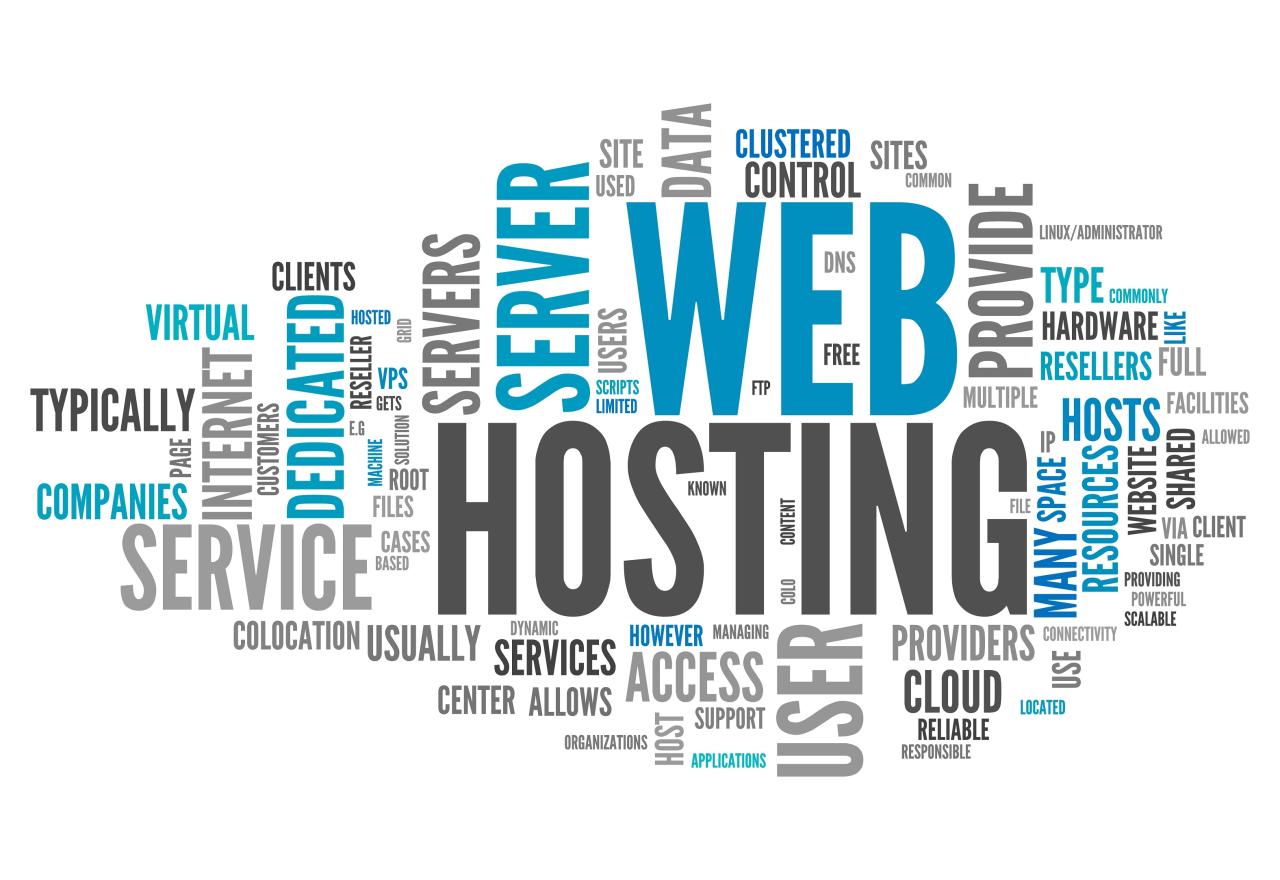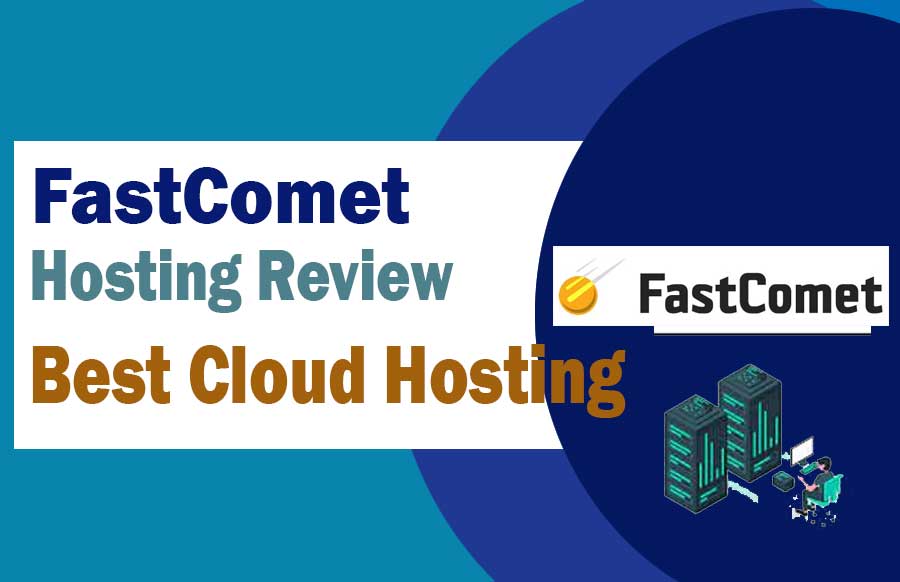Webhosting service – Web hosting service is the backbone of any online presence, providing the digital space where your website lives and thrives. It’s like renting a virtual home for your website, complete with all the necessary utilities and infrastructure to ensure it’s accessible to the world. Imagine a bustling city where websites are residents, and web hosting services are the landlords providing the essential resources for their existence.
Understanding web hosting is crucial for anyone venturing into the online world. It involves choosing the right hosting type, selecting a reliable provider, and optimizing your website for performance and security. This comprehensive guide delves into the intricacies of web hosting, equipping you with the knowledge to make informed decisions and ensure your website’s success.
Web Hosting Fundamentals
Web hosting is the process of storing your website’s files on a server so that they can be accessed by users on the internet. It’s like renting space on a computer that’s always connected to the internet, making your website available 24/7. Think of it as the foundation of your online presence.
Types of Web Hosting
Web hosting comes in different forms, each tailored to different needs and budgets.
- Shared Hosting: This is the most affordable option, where multiple websites share the same server resources. It’s ideal for basic websites with low traffic.
- VPS Hosting: A Virtual Private Server (VPS) offers more resources and control than shared hosting. You get a dedicated portion of a server, providing better performance and security.
- Dedicated Hosting: This gives you an entire server exclusively for your website. It’s the most powerful option, offering maximum performance and control, but also the most expensive.
- Cloud Hosting: This uses a network of servers to distribute your website’s resources. It offers flexibility, scalability, and high availability.
Essential Features of Web Hosting
To ensure your website runs smoothly, you need to consider these key features:
- Storage Space: This is the amount of disk space you get to store your website’s files, including images, videos, and code. The required space depends on your website’s content and size.
- Bandwidth: This represents the amount of data that can be transferred to and from your website per month. Higher bandwidth is crucial for websites with heavy traffic or large files.
- Security: A robust security system is essential to protect your website from attacks and data breaches. Look for features like firewalls, malware scanning, and SSL certificates.
- Uptime: This refers to the percentage of time your website is available online. Aim for a high uptime (ideally 99.9% or higher) to ensure your website is accessible to visitors.
- Customer Support: Reliable customer support is vital for resolving any issues or technical difficulties you encounter. Look for 24/7 support options, such as live chat, phone, and email.
Choosing the Right Web Hosting: Webhosting Service

Selecting the appropriate web hosting service is crucial for your website’s success. The right hosting solution can ensure your website loads quickly, remains stable, and is accessible to your target audience. However, choosing the wrong one can lead to slow loading times, downtime, and security vulnerabilities. This section will explore different web hosting types, factors to consider when choosing a provider, and a checklist for evaluating web hosting services.
Types of Web Hosting
Choosing the right web hosting type depends on your website’s specific needs and requirements. Understanding the advantages and disadvantages of each type will help you make an informed decision.
- Shared Hosting: This is the most affordable option, where multiple websites share the same server resources. It’s ideal for small websites with low traffic.
- Advantages: Low cost, easy to set up, minimal technical knowledge required.
- Disadvantages: Limited resources, performance can be affected by other websites on the server, security risks due to shared resources.
- VPS Hosting: Virtual Private Server (VPS) offers more resources and control than shared hosting. It provides a dedicated portion of a server, offering better performance and security.
- Advantages: More resources, better performance, increased security, root access for more control.
- Disadvantages: More expensive than shared hosting, requires some technical knowledge.
- Dedicated Hosting: This type provides an entire server dedicated solely to your website. It offers the highest level of performance, security, and control.
- Advantages: Highest performance, maximum security, complete control over the server.
- Disadvantages: Most expensive option, requires advanced technical knowledge.
- Cloud Hosting: This type utilizes a network of servers to distribute your website’s resources. It offers scalability, reliability, and flexibility.
- Advantages: Scalability, high availability, flexibility, pay-as-you-go pricing.
- Disadvantages: Can be more expensive than traditional hosting, requires some technical knowledge.
Factors to Consider When Choosing a Web Hosting Provider
Several factors influence the selection of a web hosting provider. Evaluating these factors ensures you choose a provider that aligns with your website’s needs.
- Website Traffic: Anticipate your website’s traffic volume. If you expect high traffic, consider a hosting plan with sufficient resources to handle the load. For instance, a website with high traffic volume might require a VPS or dedicated server.
- Budget: Determine your budget for web hosting. Shared hosting is the most affordable option, while dedicated hosting is the most expensive. Consider your website’s needs and budget constraints when making your choice.
- Technical Expertise: Assess your technical skills. If you’re not comfortable with technical aspects, consider a hosting provider with user-friendly interfaces and support options. Shared hosting often requires minimal technical knowledge, while dedicated hosting demands advanced skills.
- Security: Security is paramount for any website. Choose a provider that offers robust security features, such as firewalls, malware protection, and regular backups.
- Customer Support: Reliable customer support is crucial, especially for technical issues. Look for a provider with responsive and knowledgeable support staff available through various channels, like phone, email, and live chat.
- Scalability: Ensure your hosting provider offers scalable plans that can accommodate your website’s growth. As your website expands, you may need to upgrade your hosting plan to meet the increased demands.
Evaluating Web Hosting Services
Use the following checklist to evaluate web hosting services and make an informed decision:
- Server Uptime: Look for a provider with a high uptime guarantee (ideally 99.9%). This ensures your website is available to visitors most of the time.
- Data Transfer: Consider the amount of data your website transfers monthly. Choose a plan with sufficient data transfer allowance to avoid exceeding your limits.
- Disk Space: Assess the storage space required for your website’s files, including images, videos, and other content. Select a plan with enough disk space to accommodate your needs.
- Features: Explore the features offered by each provider. These may include email accounts, databases, website builders, and security tools.
- Pricing: Compare the pricing of different providers and plans. Consider the value for money and ensure the plan aligns with your budget.
- Customer Reviews: Read customer reviews and testimonials to gain insights into the provider’s reputation and service quality.
- Money-Back Guarantee: Look for a provider offering a money-back guarantee. This provides peace of mind and allows you to try the service risk-free.
Web Hosting Providers
Choosing the right web hosting provider is a crucial step in establishing your online presence. Many factors, including pricing, features, customer support, and reliability, come into play when making this decision. This section will delve into these aspects to help you make an informed choice.
Popular Web Hosting Providers Comparison
This table provides a concise comparison of some of the most popular web hosting providers. It highlights their key features, pricing, and customer support.
| Provider | Pricing | Features | Customer Support |
|—|—|—|—|
| Bluehost | Starting at $2.95/month | Shared, VPS, Dedicated, WordPress | 24/7 live chat, phone, email |
| HostGator | Starting at $2.75/month | Shared, VPS, Dedicated, Cloud | 24/7 live chat, phone, email |
| GoDaddy | Starting at $5.99/month | Shared, VPS, Dedicated, WordPress | 24/7 live chat, phone, email |
| SiteGround | Starting at $3.95/month | Shared, VPS, Dedicated, Cloud | 24/7 live chat, phone, email |
| DreamHost | Starting at $2.59/month | Shared, VPS, Dedicated, Cloud | 24/7 live chat, phone, email |
User Experiences and Testimonials
Real-world experiences from users provide valuable insights into the strengths and weaknesses of different web hosting providers. Here are some examples:
“I’ve been using Bluehost for over five years and have always been impressed with their reliability and customer support. They’ve helped me troubleshoot issues and ensure my website is always up and running.” – John Doe, Website Owner
“HostGator has been a great choice for my growing business. Their VPS hosting plan has provided the performance and scalability I need to handle increased traffic.” – Jane Smith, Entrepreneur
“SiteGround’s customer support is exceptional. They’re always quick to respond and resolve any issues I encounter.” – David Lee, Blogger
Reputation and Reliability of Major Web Hosting Companies
The reputation and reliability of a web hosting provider are crucial considerations. Reputable companies have a proven track record of delivering high-quality services, ensuring website uptime, and providing excellent customer support.
Bluehost is known for its reliability, affordability, and user-friendly interface. It is a popular choice for beginners and small businesses.
HostGator is another well-respected provider known for its robust features and competitive pricing. It offers a wide range of hosting plans to suit different needs.
GoDaddy is a large and established company with a global presence. It offers a wide range of services, including domain registration, web hosting, and marketing.
SiteGround is highly regarded for its speed, security, and exceptional customer support. It is a popular choice for websites that require high performance.
DreamHost is known for its commitment to open-source software and its focus on providing affordable and reliable hosting solutions.
Website Security and Data Protection

In the realm of web hosting, website security and data protection are paramount. A secure website not only safeguards your valuable information but also builds trust with your visitors. It’s crucial to understand the threats and vulnerabilities that can compromise your website and the measures you can take to mitigate them.
Common Website Security Threats and Vulnerabilities, Webhosting service
Website security threats and vulnerabilities can compromise the integrity and confidentiality of your website and data. These threats can range from simple errors in website design to sophisticated hacking attempts.
- Cross-Site Scripting (XSS): XSS attacks exploit vulnerabilities in website code to inject malicious scripts into web pages viewed by other users. These scripts can steal sensitive information like usernames, passwords, and credit card details.
- SQL Injection: This attack involves manipulating website input fields to execute malicious SQL queries, potentially gaining unauthorized access to databases and sensitive information.
- Brute-Force Attacks: These attacks involve systematically trying different combinations of usernames and passwords to gain unauthorized access to accounts.
- Denial-of-Service (DoS) Attacks: DoS attacks aim to overwhelm a website with traffic, making it unavailable to legitimate users. These attacks can severely disrupt business operations and damage your website’s reputation.
- Malware Infections: Malicious software can infect your website, compromising its functionality, stealing data, or redirecting visitors to harmful websites.
The Role of SSL Certificates and Firewalls
SSL certificates and firewalls play vital roles in enhancing website security.
SSL Certificates
SSL certificates are digital certificates that establish a secure connection between a website and a user’s browser. They encrypt data transmitted between the website and the user, ensuring the confidentiality and integrity of sensitive information like credit card details and login credentials. A website with an SSL certificate will have a URL starting with “https” instead of “http”. Look for the padlock icon in the address bar of your browser, indicating a secure connection.
Firewalls
Firewalls act as a barrier between your website and the internet, filtering incoming and outgoing traffic. They block unauthorized access attempts, preventing malicious traffic from reaching your website. Firewalls can be implemented at the server level, network level, or even on individual devices.
Web Hosting Trends and Innovations

The web hosting industry is constantly evolving, driven by technological advancements and changing user demands. As businesses and individuals increasingly rely on the internet, web hosting providers are innovating to offer more robust, scalable, and secure solutions. This section explores the latest trends and innovations shaping the future of web hosting.
Cloud Hosting
Cloud hosting is a popular trend, offering several advantages over traditional hosting. It involves storing and managing data on a network of remote servers instead of a single physical server. This approach provides greater flexibility, scalability, and cost-effectiveness.
- Scalability: Cloud hosting allows users to easily scale their resources up or down based on their needs, ensuring optimal performance even during traffic spikes.
- Cost-Effectiveness: Users pay only for the resources they use, making it an economical option compared to traditional hosting.
- High Availability: Cloud hosting offers high availability with redundant servers, ensuring minimal downtime in case of server failure.
Managed Hosting
Managed hosting provides a comprehensive solution, taking care of all aspects of server management, including security, updates, and backups. This service is ideal for businesses that lack the technical expertise or resources to manage their own servers.
- Reduced Overhead: Managed hosting frees up businesses from the burden of server administration, allowing them to focus on core operations.
- Expert Support: Users have access to dedicated support teams for any technical issues, ensuring a smooth and reliable hosting experience.
- Enhanced Security: Managed hosting providers implement robust security measures to protect servers and data from threats.
Serverless Computing
Serverless computing is a relatively new concept, offering a way to run code without managing servers. It allows developers to focus on building applications while the platform handles the underlying infrastructure.
- Cost Efficiency: Users pay only for the time their code is running, making it a cost-effective option for applications with varying workloads.
- Scalability: Serverless computing automatically scales resources based on demand, ensuring optimal performance even during peak usage.
- Increased Developer Productivity: Developers can focus on building applications without worrying about server management, leading to faster development cycles.
Artificial Intelligence (AI)
AI is transforming the web hosting industry by automating tasks and improving performance. AI-powered tools can monitor server performance, identify potential issues, and optimize resource allocation.
- Predictive Maintenance: AI algorithms can analyze server data to predict potential failures and proactively schedule maintenance, minimizing downtime.
- Automated Security: AI can detect and respond to security threats in real-time, protecting servers from malicious attacks.
- Personalized User Experiences: AI can personalize user experiences by analyzing browsing patterns and recommending relevant content.
Blockchain Technology
Blockchain technology is gaining traction in web hosting, offering secure and transparent data storage. It provides a decentralized and immutable ledger, ensuring data integrity and security.
- Data Security: Blockchain technology offers robust security, making it ideal for storing sensitive data.
- Transparency: All transactions are recorded on the blockchain, providing a transparent and auditable record of data changes.
- Decentralization: Data is stored across multiple nodes, reducing the risk of data loss or corruption.
Final Wrap-Up
In the digital age, web hosting is no longer a technical detail; it’s a strategic decision. By understanding the nuances of different hosting options, choosing a reputable provider, and prioritizing website optimization and security, you can establish a strong online presence and achieve your digital goals. The journey into the world of web hosting is a rewarding one, paving the way for a successful and impactful online experience.




